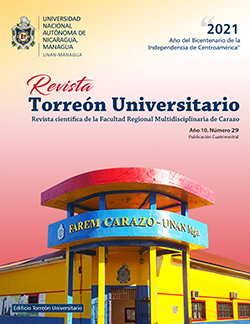Theory Based as a qualitative path in the study of old age: a narrative review
DOI:
https://doi.org/10.5377/rtu.v10i29.12731Keywords:
Grounded theory, Old ageAbstract
The objective of this narrative review is to know the contribution of Grounded Theory as a qualitative method in the study of old age.
A virtual search was carried out, in the English language databases Medline and academic Google, starting from 2007 to 2018, finding 40 original articles from 14 countries in specialized journals that carried the keywords of grounded theory and old age and that were original articles. A bibliographic search, systematization of data, selection of articles was carried out, to then carry out the analysis and final evaluation.
The results indicate that Grounded Theory was used mostly by social disciplines such as: Nursing, Psychology and Sociology, in countries such as Spain, Sweden, Canada, Mexico and the United States, with women predominant as authors and co-authors. Grounded Theory was used as the only qualitative method in most articles; applying in-depth interviews as the only data collection technique. These results denote the advance of Grounded Theory as a qualitative research methodology, in the study of social problems, being very useful to delve into issues such as old age, allowing the capture of experiences, experiences and emotions, as expressed by the informant’s keys.
Downloads
535
HTML (Español (España)) 104
VISOR (Español (España)) 0
PDF 86
HTML 28
References
Amezcua, M., & Gálvez Toro, A. (2002). Los modos de análisis en investigación cualitativa en salud: perspectiva crítica y reflexiones en voz alta. Revista Española de salud pública,76, 423-436
Ander-Egg, E. (2011). Aprender a investigar: nociones básicas para la investigación social.
Aponte D, Vaneska Cindy. (2015). Calidad de vida en la tercera edad. Ajayu Órgano de Difusión Científica del Departamento de Psicología UCBSP, 13(2), 152-182. Recuperado en 21 de junio de 2021, de http://www.scielo.org.bo/scielo.php?script=sci_arttext&pid=S2077-21612015000200003&lng=es&tlng=es.
Arias, C. y Iacub,R. (2013) Publ. UEPG Humanit. Sci., Linguist., Lett. Arts, Ponta Grossa,21 (2): 271-281, jul./dez. 2013 Disponível em http://www.revistas2.uepg.br/index.php/humanas
Arias, C. & Iacub, R. (2013). ¿Por qué investigar aspectos positivos en la vejez? Contribuciones para un cambio de paradigma. Doi: 10.5212/PublicatioHuma. v. 21i2. 00012. Publicatio UEPG: Ciências Humanas, Linguística, Letras e Artes, 21(2), 271.
Basso, S., Brisson, N., Durand, J. L., Boote, K., Lizaso, J., Jones, J. W., ... & Basso, B. (2014). How do various maize crop models vary in their responses to climate change factors? Global change biology, 20 (7), 2301-2320.
Corbetta, P. (2007) Metodología y Técnicas de Investigación Social. Edición revisada. Mcgraw-Hill/Interamericana de España.
Cruz Meléndez, Roxana (2011). RETIRO LABORAL Y AJUSTE A LA JUBILACIÓN DE HOMBRES Y MUJERES EN LA MEDIANA EDAD. Revista Electrónica "Actualidades Investigativas en Educación", 11(1),1-28. [fecha de Consulta 15 de junio de 2021]. ISSN: Disponible en: https://www.redalyc.org/articulo.oa?id=44718060016
Doblas, J. L. & Conde, M. D. P. D. (2013). La modernización social de la vejez en España. Revista Internacional de Sociología, 71(1), 65-89.
FLICK, U. (2013). Introducción a la investigación cualitativa, segunda edición. Recuperado http://investigacionsocial.sociales.uba.ar/wp-content/uploads/sites/103/2013/03/INVESTIGACIONCUALITATIVAFLICK.pdf
Fos, G. (2018). Andropausia y menopausia, tiempos de cambios. Escuela Sistemática. Argentina
Fraile M, M. (2007). Metodología y Técnicas de Investigación social. España: McGraw-Hill/Interamericana.
Glaser, B. G., y Strauss, A. L. (2017). Descubrimiento de la teoría fundamentada: Estrategias para la investigación cualitativa. Routledge.
Gómez, E. (1993) Género, mujer y salud en las Américas / editado por Elsa Gómez Gómez. — Washington, D.C.: OPS, Publicación Científica 541
Hernández S, R. & Mendoza, C (2018). Metodología de la investigación. Las rutas cuantitativa, cualitativa y mixta, Ciudad de México, México: Editorial Mc Graw Hill Education, Año de edición: 2018, ISBN: 978-1-4562-6096-5, 714.
Naciones Unidas (2020). Mujeres en la ciencia: víctimas de la desigualdad de género en pleno siglo XXI. recuperado de Noticias ONU (un.org)
Parraguez, P. O. (2006). Exclusión Generacional: La Tercera Edad. Revista Mad, (14), 47-52.
Puertas, M, F (2017) El Papel de las mujeres en la Ciencia y la Tecnología. Santillana.
Restrepo, H. E., & Málaga, H. (2001). Promoción de la salud: cómo construir vida saludable. Pan American Health Org.
Zillmer, J. & Díaz-M, B. (2018). Revisión Narrativa: elementos que la constituyen y sus potencialidades. Journal of Nursing and Health. 8. 10.15210/jonah. v8i1.13654
Vivar, Cristina G., Arantzamendi, María, López-Dicastillo, Olga, & Gordo Luis, Cristina. (2010). La Teoría Fundamentada como Metodología de Investigación Cualitativa en Enfermería. Index de Enfermería, 19(4), 283-288. Recuperado en 16 de junio de 2021, de http://scielo.isciii.es/scielo.php?script=sci_arttext&pid=S1132-12962010000300011&lng=es&tlng=es.
Published
How to Cite
Issue
Section
License
Copyright (c) 2021 Universidad Nacional Autónoma de Nicaragua, Managua

This work is licensed under a Creative Commons Attribution-NonCommercial-NoDerivatives 4.0 International License.
Los autores que publican en esta revista están de acuerdo con los siguientes términos.
- El autor o los autores de los artículos, ensayos o investigaciones conceden a la Universidad Nacional Autónoma de Nicaragua, Managua (UNAN-Managua) los derechos de edición (copyright) del trabajo enviado, por consiguiente la Universidad cuenta con el derecho exclusivo para publicar el artículo durante el periodo completo de los derechos de autor.
- Estos derechos de autor/ autores autorizan a la Revista Torreón Universitario y a la Universidad editar y divulgar/publicar el artículo en dicha Revista, incluyendo reproducción impresa y electrónica, el almacenamiento, recuperación y cualquier otro tipo de publicación, y fuentes de información secundaria como servicios de resúmenes y bases de datos, así mismo la facultan a proteger el artículo contra el uso no autorizado para su difusión por medios impresos o electrónicos (PDF, HTML, EPUB, XML u otros).
Licencia para el uso del contenido
La revista hace uso de la Licencia Creative Commons Atribución-NoComercial-SinDerivar 4.0 Internacional.
Bajo esta declaración:

Este revista está sujeta a una licencia de Creative Commons Reconocimiento-NoComercial-SinObraDerivada 4.0 Internacional. Puede ser copiada, distribuida y transmitida públicamente siempre y cuando se cite al autor y la fuente (Revista Torreón Universitario), no debe modificarse ni utilizarse con ningún fin comercial. La licencia completa se puede consultar en http://creativecommons.org/licenses/by-nc-nd/4.0/.


